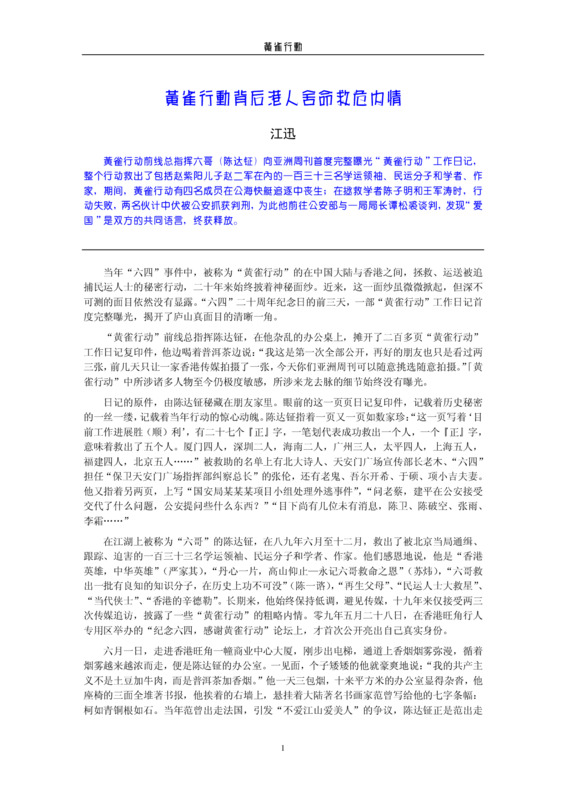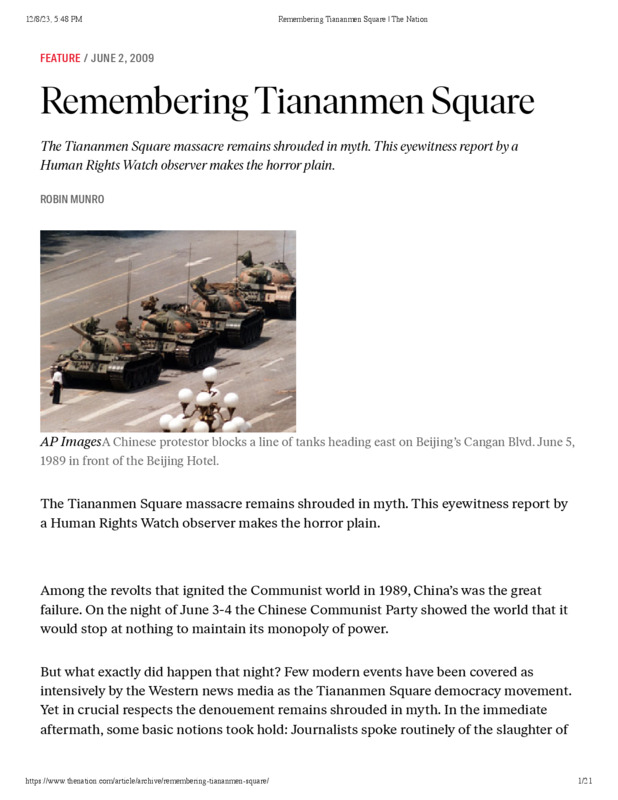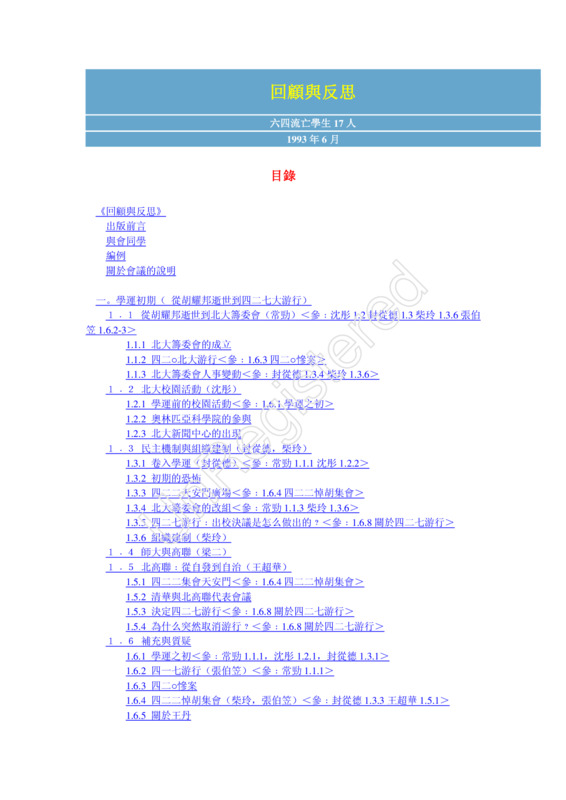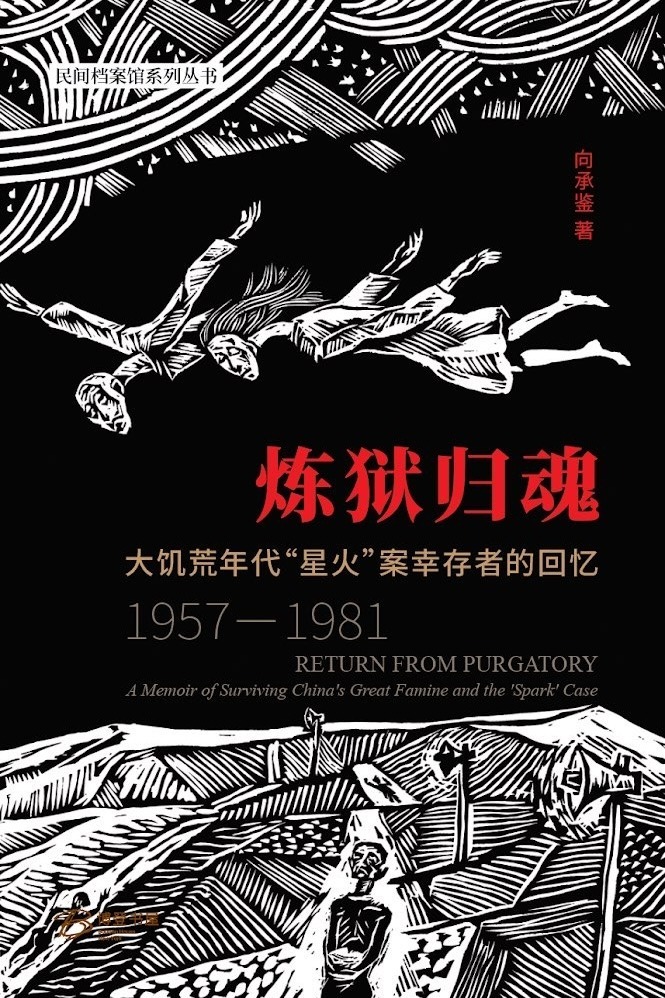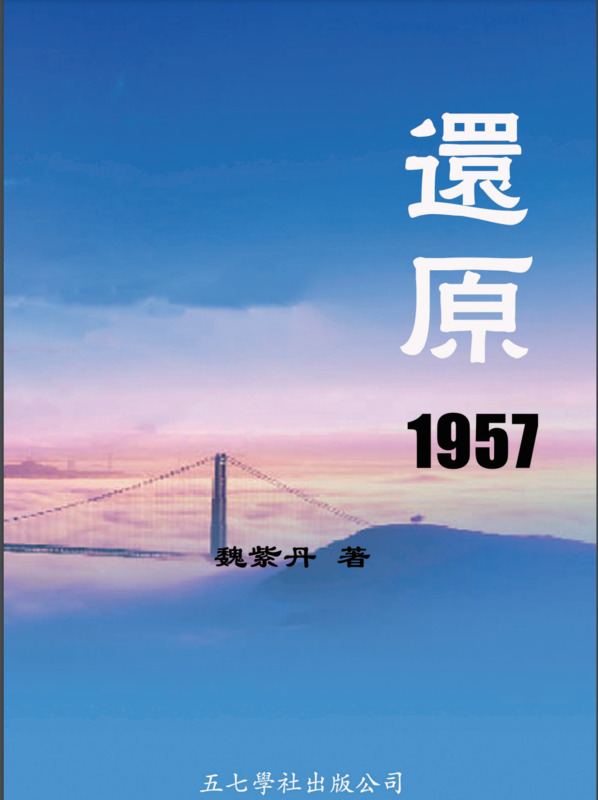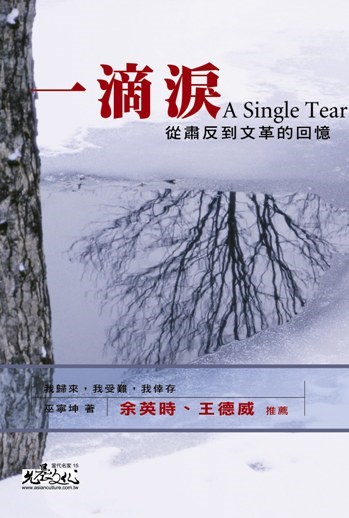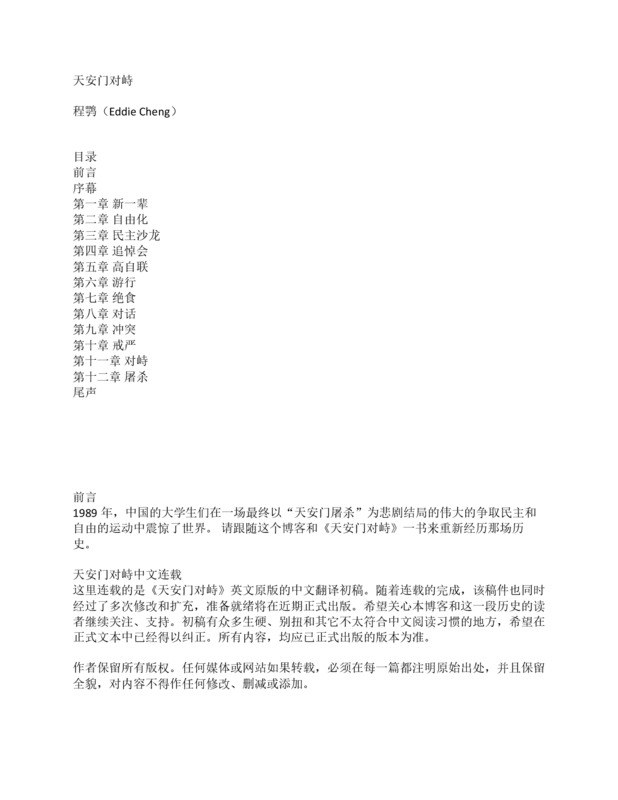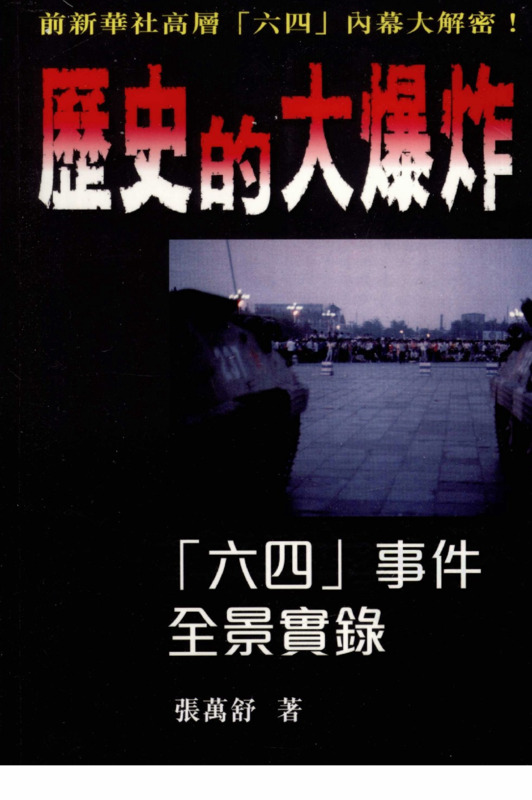Explore the collection
Showing 77 items in the collection
77 items
Book
New Biographies of the 1957 Rightists
According to official CCP statistics, some 550,000 people were directly labeled as rightists and persecuted during the Anti-Rightist campaign. These people, as well as others implicated in the campaign, are mostly unknown, except for a very few. The author, Shen Yuan, who was also labeled as a rightist when he was a university student in 1958, devoted himself to collecting and researching historical data on the anti-rightist campaign. He has compiled a book entitled Biographies of the 1957 Rightists, which attempts to present the truth about the Anti-Rightist campaign and its victims. The book is divided into four volumes of about 1.2 million words, containing the stories of about 600 rightists and about 240 historical photographs. 2016 marked the 60th anniversary of the Anti-Rightist campaign, and Shen Yuan used the original book as the basis for his New Biographies of the 1957 Rightists, expanding the number of people included to 1,588. Sha Yexin and Wu Yisan were both involved in the compilation of this book.
Article
New Evidence Concerning the Authenticity of The Tiananmen Papers
Few books on recent Chinese history have caused such controversy as "The Tiananmen Papers". The book is ostensibly a collection of original documents compiled by Zhang Liang, a pseudonym for someone claiming to be a high-ranking CCP official who leaked the papers. The book’s credibility was aided by it being edited by two well-known western scholars of China, Perry Link, then of Princeton University and now of the University of California, Riverside, as well as Columbia University professor Andrew J. Nathan. An introduction was written by Orville Schell, a well-known writer on China who was then a professor at the University of California, Berkeley.
Almost immediately upon publication, the book was criticized for its unclear provenance, a point aided by Zhang Liang’s anonymity. Most scholars agreed that the papers were a mixture of previously released documents from government offices, which were uncontroversial, and accounts of meetings between senior leaders. The latter came under scrutiny, with some saying that the language appeared stilted or seemed to mix in language used in leaders’ public speeches.
This essay by the well-known Hong Kong publisher Bao Pu points out that since 2004, most people seem to feel that the issue of provenance will never be settled but that the documents are still important historically. Bao critiques this, using books published over the past two decades to update the question of authenticity. In careful language, he further questions key points of the documents, showing that they do not match new material, such as memoirs. Bao's conclusion: the Tiananmen Papers are not documents from the CCP’s archive, which is their claim, but rather works of dubious origin that cannot be used to better understand the events leading up to the massacre of civilians on the night of June 3-4, 1989. The top-secret documents, Bao writes, are a “phantom” that must not be used as building blocks for history.
Article
Operation Yellow Bird
After the bloody suppression of the June 4 Democracy Movement, the Chinese Communist Party went on a massive manhunt for the key figures of the movement. Some Hong Kong people organized a secret channel to help pro-democracy activists escape from the Mainland, codenamed "Operation Yellow Bird." The author of this book, Jiang Xun, is a veteran of the media and describes in detail how the "Yellow Bird Operation" took place.
Book
Personal experiences of political movements
This book is a collection of many authors, most of whom were former senior officials of the Communist Party of China, such as Li Rui, Xiao Ke and others. Through the author's recollections, we can learn about the political movements of the Mao Zedong era, including the Cultural Revolution, the Anti-Rightist Movement, etc., as well as the details of many unjust cases, such as the Hu Feng case, which is quite convincing. This book was published by the Central Compilation and Translation Bureau Press in mainland China in 1998.
Book
Prisoner of the State: The Secret Journal of Premier Zhao Ziyang
“The Course of Reform”, a memoir by Zhao Ziyang, former General Secretary of the Central Committee of the Communist Party of China, was published on May 29, 2009 by New Century Press in Hong Kong. Its English translation, “Prisoner of the State: The Secret Journal of Premier Zhao Ziyang” was published on May 13 before that. According to the book's preface, in 1992, Du Guanzheng, an old subordinate of Zhao Ziyang and former director of the State Press and Publication Administration, together with Xiao Hongda, another former high-ranking CCP official, persuaded Zhao Ziyang, who was under house arrest, to organize his experiences into a book.
Purchase link: https://www.kobo.com/hk/zh/ebook/ZoerWPfG8TiqoXIYwvW2iw.
Book
Remembering Tiananmen Square
The author was a Hong Kong-based observer for the international human rights organization Human Rights Watch. Remembering Tiananmen is a long article first published in The Nationmagazine in November 1990. It was written after witnessing the crackdown around the square during the night of June 3 until 4 a.m. the next morning.
Book
Rethinking China's Democracy Movement
Author Hu Ping was involved in the Xidan Democracy Wall movement in the late 1970s and now lives in the United States.
He has successively chaired the pro-democracy publications <i>China Spring</i> and <i>Beijing Spring</i>. This book, published in 1992, analyzes the reasons for the failure of the June Fourth Movement and summarizes the lessons learned. The last two chapters suggest how to continue the pro-democracy movement in the future.
Book
Retrospect and Reflection - 17 Students in Exile on June 4
From July 17 to 24, 1991, seventeen student leaders who had participated in and led the 1989 student movement and later went into exile held a "Seminar on Historical Review and Reflection on the 1989 Student Movement" in Paris, France, to review and reflect on this great democracy movement in modern Chinese history. This book is organized according to the audio recordings of the speeches made at the seminar. It covers the following topics: the Peking University School Society Fever in 1988; the establishment of the Peking University Preparatory Committee; the founding of the Peking University Higher Education Union; the initiation of the hunger strike; the founding of the Hunger Strike Group; the founding of the Dialogue Group; the imposition of martial law; the founding of the Commanding Office of the Defense of Tiananmen Square; the founding of the Joint Meeting of the Capital; the establishment of martial law; the establishment of the Tiananmen Square Defense Command; the establishment of the Joint Meeting of Various Sectors in the Capital; the retreat from Tiananmen Square; the overseas student movement, etc. It includes rare historical material.
book
Return of the Soul from Purgatory: Memoirs of a Survivor of the "Sparks" Case from the Great Famine Era
In 1960, a group of faculty and students from Lanzhou University, who had been labeled Rightists and sent down to rural areas in Tianshui, Gansu, personally experienced the Great Famine. They self-published <i>Spark</i> magazine to expose and criticize the totalitarian rule that led to this catastrophe.<i>Spark</i> only published one issue before its participants were arrested and labeled as a counterrevolutionary group. Many were sentenced to long prison terms, and some were even executed. <a href=“http://108.160.154.72/s/china-unofficial/item/1759#lg=1&slide=0”>The first issue of <i>Spark</i> and more information about the "Spark Case" can be read here</a>.
<i>Return from Purgatory: A Survivor’s Memoir of the ‘Spark Case’ in the Great Famine Years (1957–1981)</i> is the autobiography of Xiang Chengjian, a key participant in <i>Spark</i> magazine. At the time, he and another student were responsible for printing the first issue, and he contributed six articles to <i>Spark</i>. Due to his involvement, he was sentenced to 18 years in prison for his role in the Spark case and was not rehabilitated until the early 1980s.
This memoir is divided into three sections, with a total of thirteen chapters spanning over 350,000 characters. It documents Xiang’s journey from being labeled a Rightist and sent to perform forced labor, to his arrest and 19-year imprisonment for his involvement in <i>Spark</i>, and finally to his struggle for rehabilitation and efforts to rebuild his life after release. In the book’s preface, scholar Ai Xiaoming offers the following assessment:
"Xiang Chengjian’s memoir holds significant value for the study of the intellectual history of contemporary China. First, it serves as another important testimony of the “Spark Case”, following Tan Chanxue’s memoir <i><a href=“”>Sparks: A Chronicle of the Rightist Counter-Revolutionary Group at Lanzhou University</a></i>, making it a crucial historical document on this act of resistance. The author reconstructs the social context before and after the case and describes how the young intellectuals behind <i>Spark</i> bravely challenged totalitarian rule. Second, the book provides a detailed account of labor camps in western China, with the author documenting his 18 years of forced labor in Gansu and Qinghai, unveiling a western chapter of China’s Gulag system. Third, it is a deeply personal intellectual history of a resister, showing the immense suffering, trials of life and death, and personal resilience under the crushing force of state violence."
The book’s appendix includes Xiang Chengjian’s six articles for <i>Spark</i>, an in-depth investigative report on him by journalist Jiang Xue, and a chronological record of the Spark Case compiled by Ai Xiaoming.
<i>Return from Purgatory</i> is published by Borden Press in New York and is the first book in the “People’s Archives Series”, published by the China Unofficial Archives. The author, Xiang Chengjian, has generously authorized the archive to share the book’s digital edition. Readers are encouraged to purchase the book to support the author and publisher.
Book
Revisiting 1957
<i>Revisiting 1957</i> is not just about the history of the Anti-Rightist Campaign but is also a theoretical reflection on that history. Written by Wei Zidan (the penname for Wei Liyan), the book has three sections: upper, in which the author discusses philosophical problems of the campaign; middle, in which he discusses the origins of the campaign; and lower, which contains his thoughts on lessons for the future. In Wei's view, the people who were declared rightists stood up for freedom of speech. The campaign, therefore, was an assault on freedom of expression and resulted in a human rights catastrophe for China. The book also has an eleven-part appendix with reflections on miscellaneous events.
Wei Zidan was born in Henan Province in 1933 and was a teacher in the Anyang Middle School. He himself was labeled a rightist and brings a unique insider's account of the movement but unlike some personal accounts of suffering, Wei also brings a more analytical approach to the issue.
After moving to the United States in his later years, he collected information and found the freedom to complete this book. Published in Hong Kong in 2013 by the May 7 Society Press.
Book
Science, Democracy, Rationality: Xu Liangying's Anthology
Chinese intellectual Xu Liangying is a scholar of the history of scientific thought and an active warrior in defense of human rights. He weathered China's most extreme political storms and began to speak out again after China opened up slightly in 1977. This book collects his political speeches between 1977-1999. Originally published by Spiegel Publishing in Hong Kong in 2001, the book was later made into a PDF version by Xu Liangying's family in the hope that it would be circulated online to a wider audience.
Film and Video
Spark
<i>Spark</i> tells the story of a group of young intellectuals who risked their lives to voice their opinions about the Chinese Communist Party in the 1950s and 1960s. Following the Hundred Flowers Campaign of 1957, many intellectuals were branded as Rightists and banished to work and live in rural China. A group of students from Lanzhou University were among those sent to the countryside. There, they witnessed mass famine which resulted from government policies to collectivize agriculture and force industrialization in rural China. Shocked and angered by the government’s lack of response to the Great Famine, these students banded together to publish <i>Spark</i>, an underground magazine that sought to alert the Chinese population of the unfolding famine. The first issue, printed in 1960, included poems and articles analyzing the root causes of failed policies. However, as the first issue of <i>Spark</i> was mailed and the second issue was edited, many of these students, along with locals who supported the team, were arrested. Some of the key members of the publication were sentenced to life imprisonment and later executed, while others spent decades in labor camps.
In this 2014 documentary, Hu Jie uncovers the stories of the people involved in the publication of <i>Spark</i>. He conducts interviews with former members of the magazine who survived persecution, and also shows footage of the manuscripts of the magazine. A digital copy of the original manuscript of the first volume of <i>Spark</i> is also held on our website.
This film was awarded the Special Jury Prize for Chinese Documentary at the 2014 Taiwan International Documentary Film Festival and the Award of Excellence in the Asian Competition. Later, it won the Independent Spirit Award at the Beijing Independent Film Festival.
Periodicals
Spark, Issue 1
<i>Spark</i> was an underground magazine that appeared in the Tianshui area of Gansu Province in northwestern China during the 1959-1961 Great Famine. The magazine was lost for decades but in the late 1990s began to be republished electronically, becoming the basis of documentary films, essays, and books.
In 1959, the Great Famine was spreading across China. It was witnessed by a group of Lanzhou University students who had been branded as Rightists and sent down to labor in the rural area of Tianshui. They saw countless peasants dying of hunger, and witnessed cannibalism.
Led by Zhang Chunyuan, a history student at Lanzhou University, they founded <i>Spark</i> in the hope of alerting people to the unfolding disaster and analyzing its root causes. The students pooled their money to buy a mimeograph machine, carved their own wax plates, and printed the first issue. The thirty-page publication featured Lin Zhao's long poem, "A Day in Prometheus's Passion." The first issue also featured articles, such as "The Current Situation and Duty," which dissected the tragic situation of society at that time and hoped that the revolution would be initiated by the Communist Party from within.
The students planned to send the magazine to the leaders of the provinces and cities with a view to correcting their mistakes. But before the first issue of Spark was mailed and while the second issue was still being edited, on September 30, 1960, these students in Wushan and Tianshui were arrested, along with dozens of local peasants who knew and supported them. Among them: Zhang Chunyuan was sentenced to life imprisonment and later executed; Du Yinghua, deputy secretary of the Wushan County Committee of the Chinese Communist Party, was sentenced to five years' imprisonment for having interacted with the students, and later executed. Lin Zhao was detained and also executed. Other key members, such as Gu Yan, Tan Chanxue, and Xiang Chengjian, were all sentenced to long years in labor camps.
In the 1990s, Tan Chanxue devoted herself to researching historical information and figures to bring this history to life. She found in her personnel file (<i>dan'an</i>)photographs of the magazine, as well as self-confessions and other evidence used in the students' trial. Eventually, the photos were collated into PDFs, which began to circulate around China.
Editors' note: This site the original handwritten version and a PDF of all the articles from the first issue of <i>Spark</i>. We will also make available transcripts of the essays in Chinese and are searching for volunteers to translate the texts into English. Please contact us if you're interested in helping!
Book
Sparks: A Chronicle of the Rightist Counter-Revolutionary Group at Lanzhou University
During the worst years of the 1960 famine, a group of teachers and students at Lanzhou University decided to publish an underground publication, <i>Spark</i>, to alert Chinese people to the growing disaster and expose the authoritarianism of the Chinese Communist Party. Only two issues of this underground publication were printed before it was broken up as a counter-revolutionary group case and 43 people were arrested.
The author of this book, Tan Chanxue, was a key participant and helped save the memory of <i>Spark</i> from being lost. Tan was the girlfriend of Zhang Chunyuan, the magazine's founder, and participated in key moments of the magazine's short lifespan. She was sentenced to 14 years in prison, but was later released and rehabilitated, and taught at the Jiuquan Teachers' Training School. In 1982, she was transferred to the Dunhuang Research Institute as an associate researcher, and retired in 1998, settling in Shanghai.
It is largely through Tan's efforts that we know about <i>Spark</i>. She was able to look into her personnel file (<i>dang'an</i>), where she discovered the issues of the magazine, as well as confessions of the people arrested, and even her love letters to Zhang. She photographed this material and later it was turned into PDFs, which circulated around China starting in the late 1990s, helping to inspire books and movies.
Book
Stand off at Tiananmen
This book goes beyond the individual perspective of a memoir to recount the movement from the perspective of the student collective. It focuses on the vivid portrayal of characters and their interactions. As the author puts it, this is the first time that the 1989 pro-democracy movement and the June 4 tragedy are "recounted as a complete and coherent attempt at narrative history." This book was originally written in English and published in 2009 on the 20th anniversary of June Fourth. The author himself later translated it into Chinese and released it on the eve of June 4 this year. The author, Eddie Cheng, was originally a student in the Physics Department of Peking University in the class of '80. He caught up with the election campaign right after he entered the school. Later, he became an important organizer of the student movement, having spearheaded the two campus pro-democracy campaigns of '84 and '85. In 1986, he went to the United States to study abroad. Currently he resides in the US state of Colorado.
The book can be purchased <a href="https://www.amazon.com/dp/0982320302">here</a>.
Book
Summer of 1957: From One Hundred Schools of Thought to Two Schools of Thought
This book comprehensively records and analyzes the Anti-Rightist Campaign.
The author Zhu Zheng was born in 1931. He was once the editor of Hunan People's Publishing House and a well-known expert on Lu Xun in China. He was classified as a Rightist in 1957 and personally experienced the Anti-Rightist Campaign. This book references information from CCP party newspapers at that time, as well as his recollections, making this book informative and reliable.
The "two dueling schools of thought" in the subtitle of this book comes from The Selected Works of Mao Zedong. Mao called for one hundred schools of thought to contend but in fact only intended for two to compete: the bourgeoisie and the proletariat.
This book was first published by Henan People's Publishing House in 1998. It is one of the earliest studies of the movement in China.
Book
The Big Bang of History:June Fourth Movement Record
This book was published in Hong Kong in 2009, on the eve of the 20th anniversary of June Fourth. The author, Zhang Wanshu, was the Director of the Domestic News Department of Xinhua News Agency during the June Fourth Incident. This book provides a historical account of the June 4 incident from the unique perspective of the official media, including a lot of insider information. Famous journalist Yang Jijian commented that the book's historical authenticity is beyond doubt, and that it is an indispensable historical document for the study of the June Fourth Incident. In the form of daily events, the book records the situation from April 14th to June 10th, 1989—including the mobilization of 10 armies by the Central Military Commission from the five major military regions, their march to Tiananmen Square along six routes, and the army's entry into the city in disguise, etc. Of particular interest is Zhang Wanshu's citation of Tan Yunhe, then party secretary of the Red Cross Society of China, who said that there were 727 deaths in the June 4 incident—including 713 students and mass deaths and 14 military deaths. This figure is far from the 2,700 recorded by the Red Cross Society of China and has led to much controversy.
Book
The Doubtful Clouds of 1957-- Cracking the Code of the Anti-Rightist Movement
The Anti-Rightist Movement in China began in 1957 with the reorganization of intellectuals, followed by the Great Leap Forward, the People's Commune, and a series of calamities such as the Great Famine. The Hong Kong Five Sevens Society was founded in 2007 with the aim of collecting, organizing, and researching historical information about the Anti-Rightist Movement. It is headed by Wu Yisan, a writer who moved to Hong Kong from mainland China. The author of this book, Shen Yuan, who was also a Rightist at the time. He has systematically researched and organized the Anti-Rightist Movement that took place in 1957 and attempted to answer some of the unanswered questions.
Book
The Goddess of Freedom of the Chinese Nation -- An Anthology of Essays in Honor of Lin Zhao 40 Years After Her Death
Lin Zhao, formerly known as Peng Lingzhao, a native of Suzhou, was admitted to the journalism department of Peking University in 1954, but was classified as a Rightist in 1957. She was arrested and imprisoned in October 1960 because of her involvement with the underground magazine <i>Spark</i>. In 1965, Lin Zhao was sentenced to 20 years' imprisonment for "counter-revolutionary crimes." On April 29, 1968, she was sentenced to death and executed on the same day at the age of 36. This book is a collection of more than sixty articles written in memory of Lin Zhao.


